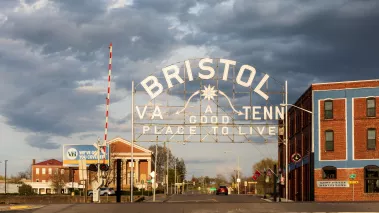Table of Contents
Bristol, Tennessee bans comments on its social media pages that would ‘negatively affect the city’s image’

Nolichuckyjake / Shutterstock.com
When the government opens up a forum for public expression, it cannot pick and choose which views people are allowed to express. But that’s what the government of Bristol, Tennessee, is doing through its policy restricting comments on the city’s social media pages.
FIRE and the National Coalition Against Censorship wrote Bristol on Tuesday objecting to the unconstitutional policy.
Bristol’s “Social Media Comments Policy” proclaims its Facebook, Twitter, and other social media pages seek to “present matter[s] of public interest in Bristol to our many residents, businesses and visitors.” Bristol encourages the pages’ visitors to submit “questions, comments, and concerns,” but states that the city reserves the right to delete comments that fall into one of a number of categories, including:
- Vulgar language
- Personal attacks
- Disparaging comments of any kind
- Offensive comments that target or disparage any ethnic, racial, or religious group
- Advocate illegal activity
- Contain any information or statements that would negatively affect the city’s image
These restrictions burden constitutionally protected speech.
When Bristol writes on its websites and social media feeds, it’s speaking for itself. That’s the city’s own speech. Public officials can, of course, say what they want, selectively promoting certain ideas and views, without violating the First Amendment.
But the public has a First Amendment right to respond in kind.
It is all too easy to envision the city using the policy to suppress criticism of government officials and to sweep any complaints related to the city or its administration under the rug.
As many courts have ruled, the interactive space of a government social media account — where the public can comment on the account’s posts — is a public forum where First Amendment protections apply. When you reply to a @POTUS tweet, you are speaking, not the president.
By opening its social media pages to public comment and expressly encouraging visitors to submit “questions, comments, and concerns,” Bristol created a public forum. And a cardinal rule of First Amendment law is the government may not suppress speech because of the view it expresses. Yet, the city’s restrictions on public comments do exactly that, prohibiting, among other things, speech that “would negatively affect the City’s image.”
The Supreme Court has explained that even a speech restriction that “evenhandedly prohibits disparagement of all groups” amounts to viewpoint discrimination under the First Amendment. Bristol’s policy, for example, would enable the city to delete comments that “disparage” or “attack” a public official — all while leaving up comments that praise that same official. That’s unconstitutional.
The policy is also overbroad. It targets comments that “advocate illegal activity,” but as FIRE and NCAC told Bristol:
While the First Amendment does not protect speech that advocates and is likely to result in immediate illegal activity, mere abstract advocacy of unlawful conduct is fully protected. Were it otherwise, the government could ban speech promoting anything from civil disobedience to the mental health benefits of psychedelic drugs.
Even beyond that failing, the policy fails First Amendment scrutiny for still another reason: It’s unconstitutionally vague. It lacks specificity regarding what speech could “negatively affect the City’s image” or be considered “disparaging” or a “personal attack.” Vague rules leave too much room for interpretation, heightening the risk of arbitrary enforcement.
As our letter explained, “It is all too easy to envision the city using the policy to suppress criticism of government officials and to sweep any complaints related to the city or its administration under the rug.” This can’t be squared with the Supreme Court’s recognition in Hustler Magazine v. Falwell that the “free flow of ideas and opinions on matters of public interest and concern” lies at the “heart” of the First Amendment.
HUSTLER MAGAZINE AND LARRY C. FLYNT v. JERRY FALWELL
Supreme Court Cases
Can a public figure recover damages for emotional distress because of an offensive parody?
The city is certainly not the first government actor to restrict First Amendment-protected activity on government-run social media pages. A 2020 FIRE survey documented how public colleges and universities regularly censor comments on their social media pages — blocking users, creating secret blacklists of forbidden words and phrases, and filtering out comments that might negatively reflect on the institution, such as those about campus controversies or the college’s corporate partners or sports teams.
Just like those colleges and universities, Bristol’s government has control over its own speech. But as FIRE and NCAC told the city, “it has no authority to curate a public forum to resemble a marketing brochure.”
The city acknowledged receipt of our letter and promised a response. We will keep readers updated.
Recent Articles
FIRE’s award-winning Newsdesk covers the free speech news you need to stay informed.

O holy fight: New Hampshire Satanic Temple statue threatened by more than vandals

California and other states are rushing to regulate AI. This is what they’re missing

One day after FIRE lawsuit, Congress passes changes to filming permits in national parks


